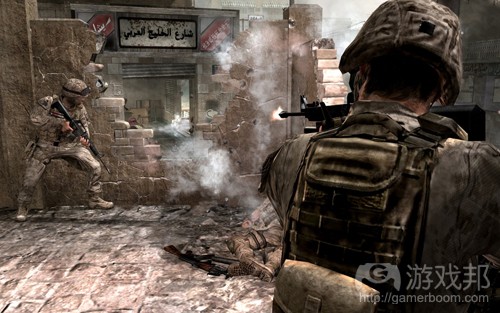Michael Pachter称免费游戏仍存在改进空间
作者:Jon Jordan
游戏分析师Michael Pachter不喜欢免费游戏模式。
他在布莱顿Develop大会上称:“在2000年以前,一切都很简单。如果玩家想要某款游戏,花钱买就是了。”
对开发商和发行商以及所有理解这条规则的人来说,那时的游戏产业更容易预测。
“如果某款游戏的售价达不到开发成本的五倍,那这款游戏就不会出炉。大家都明白这个道理。”这是他对盒装游戏产品的看法。
艰难时期?
2008年是盒装游戏产业最后一个增长年。同时,制作游戏的成本也持续增加。
Pachter认为游戏行业的另一个大转变是,多人游戏模式的出现,特别是在安装有《光晕》这类游戏的游戏机上。
现在,每月有2500万人在玩《使命召唤》,占据游戏机玩家的二到三成。
随着智能手机和社交游戏的崛起,多人游戏模式彻底改变了游戏产业。
他认为:“平板电脑非常有利于手机游戏发展。手机游戏会越来越多,社交游戏也是如此。”
任天堂之难
他还指出,手机和社交游戏的出现扼杀了Wii平台。
这与任天堂打理生意的方式也有关系。Pachter提出当任天堂放弃硬核玩家和大量延长Wii更新的发布时间时,该公司就失算了。
他认为:“任天堂必须在Wii U上安装像《使命召唤》这样的游戏。玩家不会只为了玩任天堂的游戏而购买游戏机。”
“曾购买Wii的玩家现在基本上在玩《FarmVille》这类游戏。”
尽管不喜欢免费游戏的商业模式,但Pachter很看好Zynga。
“所有的Zynga游戏我都玩。《FarmVille》很傻,《CityVille》好一些, 《CastleVille》非常棒。”
就游戏提供的体验范围和玩家消费的方式而言,他觉得社交游戏就好比赌场。
Pachter一语中的:“社交才是游戏的实际入口。”
改变
但说到盈利,Pachter认为多人模式是游戏行为最大的威胁。
“玩家在《使命召唤》这类多人游戏中平均每小时只投入12美分,而看电视每小时的投入就达到58美分。”
这种情况在免费游戏中更糟了。
他声称:“我认为免费游戏的问题在于它是免费的。其他娱乐媒体都不会这么放送自己的内容。”
他预测这种状况会随着广告嵌入游戏而改变,将会有新的盈利模式出现。
“我认为大约到2020年,免费模式会消失。即使不采用广告也会以其他东西取而代之。”
Patcher不能确定在当前平板电脑和流媒体服务不断发展的情况下,市场上是否还会出现新一代游戏机。
但他希望更多游戏转向服务模式,即开发商和发行商增加额外高级服务,减少免费内容。”(本文为游戏邦/gamerboom.com编译,拒绝任何不保留版权的转载,如需转载请联系:游戏邦)
Develop 2012: Michael Pachter on why free-to-play gaming needs to be reinvented
by Jon Jordan
Game analyst Michael Pachter isn’t a fan of the free-to-play business model.
“Before 2000, it was a simple life. If people wanted your content, they paid for it,” he said in his Develop Brighton talk.
This also made the business more predictable for developers and publishers and everyone understood the rules.
“If your game wasn’t predicted to sell five times its costs, it wouldn’t be made. Everyone knew that,” he said of the boxed product world.
Bad times?
But 2008 was the last growth year for the packaged goods sector. Meanwhile the cost of making games has continued to rise.
Pachter argued another big change in the industry was the rise of multiplayer gaming, especially on consoles with games such as Halo
Now 25 million uniques are playing Call of Duty every month. That’s 20-30 percent of all console owners.
Combined with the rise of smartphones and social gaming, this has radically changed the games business.
“Tablets are so positive for mobile gaming,. Mobile games will keep getting bigger. Social games will continue to be big,” he said.
NintEnd…o
He also argued that the rise of mobile and social games helped kill off the Wii.
This was combined with the way Nintendo has handled the business. Pachter said the company lost the plot when it gave up on hardcore gamers and took too long to release a follow up to the Wii.
“Nintendo needs games such as Call of Duty on Wii U. People won’t buy a console just want to play Nintendo games,” he said.
“People who bought Wiis are now playing FarmVille.”
Indeed, despite not liking the free-to-play business model, Pachter is bullish on Zynga.
“I play all Zynga games. FarmVille was stupid. CityVille was better. CastleVille was brilliant.”
He described social games as like casinos, in terms of the range of experiences on offer and the way people spend money.
“Social is the defacto entry point for games,” Pachter.
C-c-c-changes
But coming back to monetisation, Pachter called multiplayer is the biggest threat to the games industry because it is crack.
“People only spend around 12c per hour on a multiplayer game like Call of Duty, while they pay 58c per hour to watch TV,” he argues.
It’s even worst for free-to-play games.
“My problem with free-to-play is that it’s free,” he stated. “No other entertainment medium gives its content away.”
He predicted this would change with more adverts put within games and that there will be new monetisation models.
“I think free-to-play will go away, probably by 2020. If it’s not ads, it will be something else.”
And more widely, Patcher wasn’t convinced there would be another generation of consoles, especially with the growth of tablets and streaming services.
Instead, he expected many games will move to a service model, with developers and publishers reducing the availability of free content with premium and elite services.(source: pocketgamer)








































 闽公网安备35020302001549号
闽公网安备35020302001549号